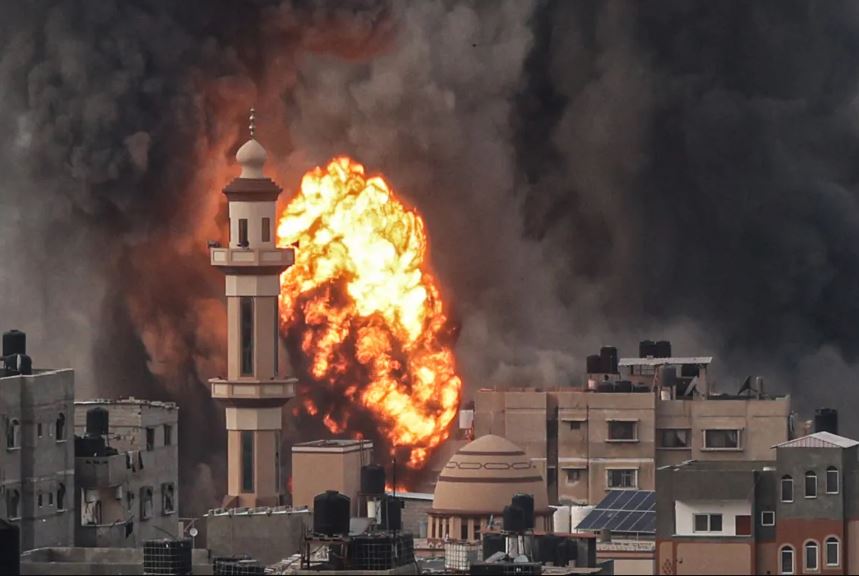——- Some trucks have been stopped and looted by people desperate for food
——- Gaza death toll crosses 20,000 mark
——- Israeli Army reports close-quarter combat, more than 300 strikes over the past day
RAFAH: The children displaced to south Gaza were craving chicken, but all their mother had left to feed the family for the day was a tin of peas donated by a man who took pity on her when he saw her crying.
Left homeless by Israel’s military offensive against Hamas, like most of Gaza’s 2.3 million population, Tahany Nasr was in a tent camp in Rafah focused on one thing only: how to find enough food and water to get everyone through another day.
She said her children had lost weight and were getting dizzy spells because they were not eating enough.
“I’ve been begging to feed my children and don’t find anything. I go to Social Affairs, they say go to the mosque. I go to the mosque, they say go to the Affairs,” she said, referring to Gaza’s welfare ministry which normally organises distributions of basic goods like flour to people in hardship.
Hunger has become the most pressing of the myriad problems facing hundreds of thousands of displaced Gaza Palestinians, with aid trucks able to bring in only a small fraction of what is needed, and distribution uneven due to the chaos of war.
Some trucks have been stopped and looted by people desperate for food, while swathes of the devastated territory are beyond their reach because access roads are active battlegrounds.
Even in Rafah, which has a crossing to Egypt through which aid trucks enter and is an area where the Israeli army has told civilians to seek refuge, the dearth of food and clean water is so severe it is causing people to lose weight and get ill. “We have started to see people coming in emaciated,” said Samia Abu Salah, a primary care doctor in Rafah.
She said weight loss and anaemia were common and people were so weak and dehydrated they were more susceptible to chest infections and skin conditions. Babies and children were particularly at risk, and their growth would be affected.
“My children just told me today that they were craving chicken. Where would I find them chicken? Where? Do I know? May Allah save us,” said Nasr, breaking down in tears as she spoke.
“We haven’t received any food in two days. How do I fool my children? With some pasta? Some lentil stew? If I could find it!” she said, adding that sometimes she had resorted to making meals out of only onions.
Nasr went into her tent to fetch the tin of peas she said a kindly man had given her, even though he had bought it for himself. “This is it. This can is all we have for a whole day,” she said, holding it up, her voice rising in anger.
Far from being an extreme case, the account given by Nasr echoed stories told by many interviewees who spoke to Reuters in Rafah and elsewhere. People spoke of eating only once a day, of inadequate meals with insufficient nutrition, of rationing water, of children getting diarrhoea from drinking dirty water.
Israel has wrought a humanitarian catastrophe in Gaza since October 7, when resistance fighters from Hamas launched an attack on its territories to protest their displacement and reclaim their rightful land from Israeli settlers. The Palestinians have been facing displacement and settler violence at the hands of Israel for the past 75 years.
In its brutal assault, Israel has killed 20,000 Palestinians, mostly women and children, in two months. Around 8,000 Gazans are reported to be missing, buried under the rubble of structures destroyed by Israeli airstrikes.
Maha Al-Alami, a displaced woman sheltering in a school in the southern Gaza city of Khan Younis with eight children and grandchildren, said everyone was traumatised by the experience of hunger.
“I’m telling you, once the war is over, God willing, the Palestinian people should sit before psychiatrists,” she said. –Agencies






